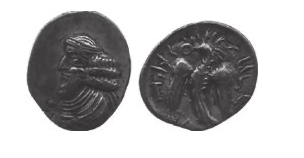I while back, Shamekh H posted this tweet:
"There is a Persian idiom which literally translates as "to have the servitude ring of someone in one's ear" which means great loyalty to someone. Achaemenid officials in Persepolis reliefs have earrings while the king and princes don't. The rings seem signify such servitude and loyalty".
The idiom is used both in classic Persian poetry and in contemporary Persian. The 14th century Persian Poet, Hafez, used it proudly to denote his devotion to the sage leader of the magi (a mythical sage serving wine). Various forms of the expression are still used.
Me: As in chained (symbolically)?
Shamekh: Perhaps took pride in their loyalty.
Me: 🙂 Perhaps...
Shamekh: In Persian literature there are examples where this expression is used proudly. And in Persepolis reliefs it is almost more common among high ranking officials. The kings and crown Princes are never depicted with the earrings.
Me: You know the expression "servant of god"? Check this article "Angra Mainyu" (and linked articles) talking about lion symbolism and Persian kings being God's representatives on earth...
Shamekh: I will read it and I'm sure I will learn things from it. In my own tweet I was more concerned about the symbolism of a small ornament.
Me: Yes, but why would someone be proud to be servant of anyone...Maybe because they saw themselves as being servants of god himself...
Shamekh: I've got my personal impressions. But first, I have to read the article to learn things before I discuss my personal point. That way, I will be able to learn even more through the whole discussion.
Me: About the (ear) rings...
Me: Lutf 'Ali Khan, Drawing of Sasanian rock relief: Ardashir I (r. A.D. 224-241) and the Zoroastrian divinity Ahura Mazda at Naqsh-i Rustam, southern Iran, A.D. 1860 (drawing). Currently in The Met: Ancient Near Eastern Art.
Me: Silver coin of Persis, via Parthian rule, c. 140 BCE. The second image is a bird of prey with a diadem in its beak. The symbol itself is said to represent "Xvarənah" (glory/power of royalty and God).
Me: It is interesting that it is an eagle giving the ring, considering the link between eagles, rain, (rain) gods...
Now Ganjajizz joined the discussion...
Ganjajizz: They used to say at the time during achaemenid era that the people were "slaves to the king" And the king rules by divine mandate (the just server of god; ahura-mazda). It is called "Farr", only given to the chosen/worthy...Farr or Xvarenah means "glory/fortune". Etymologically it is connected to light. Many mazdaen/zoroastrian Yazatas/Divinities possess it, such as Ahura Mazda, and Mithra (who is "the most endowed").
Shamekh: Since words with the same denotation can have opposing connotations, they can sometimes be mis-interpreted. The word 'slave' can be a too strong word here. And I agree that the concept of Farr or (فره ایزدی) was part of ancient Iranian belief system.
Ganjajizz: Yes but that is the term some foreigners used iirc, I’m only making reference to that. What it really means is that people were loyal subjects, not literal slaves
Shamekh: I know. And that's how words can be misinterpreted across cultures.
King Typo: The Hebrews may have connoted ear piercing with servitude. I read that a slave who had completed his term could choose to stay on in perpetuity, at which point his ear would be nailed to his master's doorpost. Possible connection?
Shamekh: Possible connection, but in a most grotesque manner. Seems more relevant to a penal code dealing with runaway slaves.
King Typo: I believe it was done voluntarily, not as a punishment
Shamekh: I didn't know that. Thank you for sharing the information. These pieces of information serve as pieces of a puzzle.
Now Janaína joined the conversation
"If you buy a Hebrew servant, he is to serve you for six years. But in the seventh year, he shall go free, without paying anything. 3 If he comes alone, he is to go free alone; but if he has a wife when he comes, she is to go with him. 4 If his master gives him a wife and she bears him sons or daughters, the woman and her children shall belong to her master, and only the man shall go free.
But if the servant declares, ‘I love my master and my wife and children and do not want to go free,’ 6 then his master must take him before the judges.[a] He shall take him to the door or the doorpost and pierce his ear with an awl. Then he will be his servant for life."
Shamekh: Thank you so much for the reference




No comments:
Post a Comment